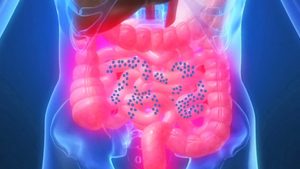

 What Is the Gut Microbiota?
What Is the Gut Microbiota?Your digestive system has tens of trillions of bugs. The combination of these various microorganisms is referred to as the gut microbiota. The gut microbiota can take up as much as five pounds of your body weight and includes over 1,000 different species of bacteria. Approximately 1/3 of your gut microbiota is common with other people, but 2/3 of the gut microbiota is unique to you!
The moment you were born, your digestive tract started to become colonized with bugs from your mother’s skin, the air, and the doctors around you. The composition of your gut microbiota depends on the way you were fed: breast milk, formula, and type of formula, or maybe you were too sick to feed right away. As a baby, your gut microbiota is constantly changing, but at about age three, it starts to become stable.
Prebiotics are the “food” for good bacteria. Prebiotics allow the growth of beneficial bacteria and help improve the function of the gut microbiota. You probably already eat prebiotics in your diet and do not realize it. Some foods that contain prebiotics include:
Probiotics are live microorganisms that help the gut microbiota keep its diversity and balance. They help promote a healthy digestive tract and healthy immune system, and they may help prevent and treat some illness. Probiotics are found in several fermented foods, including:
Probiotics are also available in most grocery stores and pharmacies.
Illnesses, antibiotics and other medications, and stressors on your body will cause the gut microbiota to change. Sometimes an imbalance can occur in the gut microbiota and lead to gut dysbiosis. Gut dysbiosis can be linked to several health problems such as Irritable Bowel Syndrome, Inflammatory Bowel Disease, allergies, and obesity.
Food is the best medicine for our body. The food we choose to eat plays an essential role in maintaining an optimal gut microbiota. What we consume has a direct effect on the balance and diversity of the tens of trillions of microorganisms living in our digestive system. It is important that children are given a varied and balanced diet as we continue to learn about the role the gut microbiota plays in preventing disease. Remember, we are what we eat.
If you would like more information about gastrointestinal (GI) digestive disorders and nutrition in children, please contact Dr. Mona Dave’s Frisco Office or Request Appointment Here.